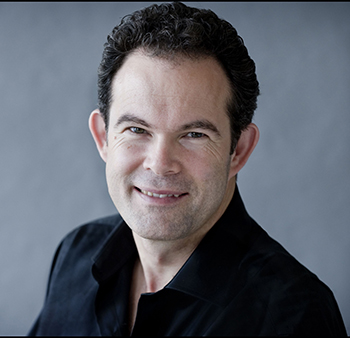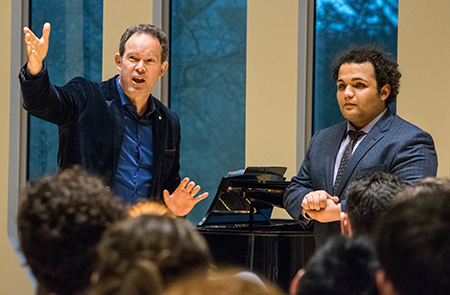by David Kulma

Fantastic in Mozart and new opera, now expanding into heavier repertoire, Finley was in glorious voice throughout this recital, from his full, resonant lower register up to his high, heroic tones. The care he took not only with the music and text, but with the storytelling and characterization for each song — from biting sarcasm to tender love to utter silliness — showed why he is one of the finest exponents of classical singing today.
McMahon, a vocal coach as well as an astounding pianist, played with great sensitivity and power. The varied Romantic repertoire showcased his ability to swing from the clarity of Beethoven’s writing to Schubert’s land of colors, and then, as the piano parts thickened in the Russian half, to fill out massive chords and textures while still leaving room for Finley to explore.
The German first half highlighted works with texts by Johann Wolfgang von Goethe. The opening set showed Beethoven to be a fine composer of lieder in the traditional mold. The first three songs focused on love, while “Aus Goethes Faust” tells the story of a king who knights a flea, with biting results.
The excellent eight-lieder set by Schubert ranged from beautiful, sad songs to cynical tales from Greek myth, to the well-known tour de force Erlkönig. While each song was wonderful, the powerhouse performance of Erlking left an indelible imprint. McMahon tackled the devilish piano writing with aplomb as the horse hooves shudder across this bogeyman tale. Finley’s powerful interpretation colored all four characters beautifully as the ballad switches from narrator to father, to dying son, to the mystical Erlking himself.
The Russian art song tradition of romances is first and foremost built upon tuneful melody, but beautiful poetry filled out the four Tchaikovsky selections and six by Rachmaninoff. These included words by Count Alexei K. Tolstoy (a lyric poet and dramatist relative of Lev) and even Goethe in Russian translation (Tchaikovsky’s well-known None, but the Lonely Heart).
As in the first half, Finley helpfully framed each set by speaking about the songs beforehand. While the Tchaikovsky songs were lovely, the real gems were by Rachmaninoff. Amid his love of overpowering melodies and lovelorn lyrics, Rachmaninoff’s choices of cynical poems give his music a complex emotional power. His Beethoven-quoting Fate drives deep into bitterness, while Christ Is Risen points out our painful human hypocrisy. Finley and McMahon performed these songs with a sorrowful weight full of tone and misery.
The English-language encores featured three folk-song arrangements. Both Aaron Copland’s “Ching-A-Ring Chaw” from his Old American Songs and Benjamin Britten’s tall tale The Crocodile were delightfully humorous, while an unexpected Scottish air by Ottorino Respighi was pleasantly nostalgic. Finley’s perfectly calibrated yips at the end of the Copland and Britten capped a glorious evening with a smile.
Published on ClevelandClassical.com April 23, 2018.
Click here for a printable copy of this article




